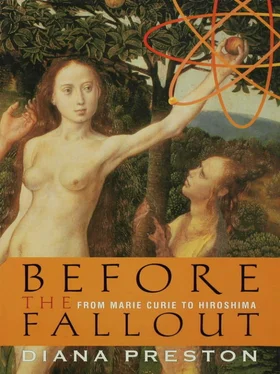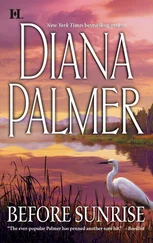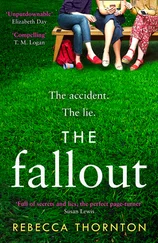Stimson recommended that the president appoint “a personal representative of himself.” He chose James Byrnes. Among the other members were Vannevar Bush and James Conant. The committee quickly spawned a scientific advisory panel comprising Arthur Compton, Enrico Fermi, Ernest Lawrence, and Robert Oppenheimer. Although the topic did not fall within its initial terms of reference, the Interim Committee discussed the deployment of the bomb on 31 May and 1 June, with its scientific advisory panel in attendance.
As is often the case, some of the most important discussions were informal ones. On this occasion they took place not in the men’s rooms but around the lunch tables. Lawrence, in discussion with Byrnes, proposed that the bomb “ought to be demonstrated to the Japanese in some innocuous but striking manner, before it should be used in such a way as to kill many people.” In a discussion that lasted no more than “perhaps ten minutes,” according to Lawrence, much cold water was poured on Lawrence’s idea. Oppenheimer could not envisage a demonstration that would be “sufficiently spectacular to convince the Japs that further resistance was useless.” Byrnes was concerned that if the Japanese were warned of impending nuclear attacks, they might move Allied prisoners of war into the target areas. Certainly their air defenses, such as they were, would be activated. Others worried about what would happen if a supposedly imposing demonstration were to fail. Stimson suggested that casualties from an attack would be unlikely to differ significantly from those resulting from the massive fire raids on cities such as Tokyo.
When the meeting formally reconvened after lunch, the minutes recorded the following decision: “After much discussion concerning various types of targets and the effects to be produced, the Secretary [Stimson] expressed the conclusion, on which there was general agreement, that we could not give the Japanese any warning; that we could not concentrate on a civilian area; but that we should seek to make a profound psychological impression on as many of the inhabitants as possible…. the most desirable target would be a vital war plant employing a large number of workers and closely surrounded by workers’ houses.” The target of a vital war plant, even closely surrounded by workers’ houses, differed from the city center suggested by the Target Committee and was later adjusted toward the latter’s views.
Stimson’s diary reveals that he was concerned not only about the effects of the use of the atomic bomb but also about the morality of the growing civilian casualties caused by conventional bombings. Prior to the Interim Committee meeting he acted decisively to remove one city—Kyoto—from the list of potential targets for the atomic bomb. According to Groves, “The reason for his objection was that Kyoto was the ancient capital of Japan, a historical city, and one that was of great religious significance to the Japanese…. the decision should be governed by the historical position that the United States would occupy after the war. He felt very strongly that anything that would tend in any way to damage this position would be unfortunate.”
Although Groves pursued the matter several times, this was one of the few occasions when he failed to win. After the war he conceded, “I was very glad that I had been over-ruled.” Groves noted that Kyoto benefited by being retained by him on the reserved target list for some time in the hope of changing Stimson’s mind. The city was thus protected from conventional bombing and survived the war virtually intact. Over the next weeks Nagasaki replaced Kyoto on the target list.
Immediately after the Interim Committee meeting, on 1 June, Byrnes reported the strategy to the president, who, according to Byrnes, told him “he could think of no alternative and found himself in accord.” This, and an entry in Truman’s diary for 24 July in which he likened the bomb to the fiery destruction prophesied in the Bible to follow Noah’s flood but noting his agreement to its deployment, are the nearest to a recorded decision by President Truman to proceed with the use of the bomb.
The Interim Committee also discussed at its 31 May meeting the international dimension of nuclear energy and, in particular, relations with the Soviet Union. Oppenheimer argued that the United States should offer “to the world free interchange of information with particular emphasis on the development of peace-time uses. The basic goal of all endeavors in the field should be the enlargement of human welfare. If we were to offer to exchange information before the bomb was actually used, our moral position would be greatly strengthened.” However, Byrnes quashed the proposals, as the minutes record: “Mr. Byrnes expressed a fear that if information were given to the Russians, even in general terms, Stalin would ask to be brought into the partnership… particularly… in view of our commitments and pledges of cooperation with the British. In this connection Dr. Bush pointed out that even the British do not have any of our blueprints on plants. Mr. Byrnes expressed the view which was generally agreed to by all present that the most desirable program would be to push ahead as fast as possible in production and research to make certain that we stay ahead and at the same time make every effort to better our political relations with Russia.” Byrnes had been impressed by evidence from scientists and industrialists that the Soviet Union would take from four to ten years to catch up with the United States and that this would give the latter a major diplomatic advantage throughout the period.
General Groves introduced a further topic at that meeting: the presence within the project of “certain scientists of doubtful discretion and uncertain loyalty.” This was a reference, above all, to the activities of Leo Szilard. Groves was still deeply suspicious of the Hungarian. He had never allowed him to set foot on the Los Alamos site and had for a time had him removed from the project. Although Szilard had been reinstated to work as a consultant at the Met Lab in Chicago, Groves had ordered the FBI to keep him under strict surveillance. Their reports threw up only the obvious: “The subject is of Jewish extraction, has a fondness for delicacies and frequently makes purchases in delicatessen stores, usually eats his breakfast in drugstores… usually is shaved in a barber shop, speaks occasionally in a foreign tongue, and associates mostly with people of Jewish extraction. He is inclined to be rather absent-minded and eccentric.”
By early 1945 Szilard had become preoccupied by the potential dangers of a nuclear arms race leading to a first strike motivated by fear or perceived danger rather than an actual threat. He was convinced that only an international system of controls could forestall such a danger. He decided that because he was so far out of the Manhattan Project’s mainstream and because his nemesis, Groves, had so compartmentalized the project on security grounds, he should approach Roosevelt direct. Because “I didn’t suppose that he would know who I was,” he asked Albert Einstein for a letter of introduction, which the latter gladly provided. Believing that Eleanor Roosevelt might be a useful conduit to the president, Szilard sent the introductory letter to her in late March. She agreed to meet him in early May, but the president’s death intervened.
Szilard then managed to secure a meeting at the White House on 25 May, where he was told by Truman’s appointments secretary that the president had suggested he should meet Byrnes at his home in South Carolina to discuss the issue. The meeting to which Harold Urey and another scientist accompanied him two days later was not a success. (Urey had by now become another of Groves’s betes noires. The general thought him completely ineffectual: “He was not a doer himself and could never make decisions. At heart he was a coward.”) Szilard lectured Byrnes about the dangers of even testing a bomb, which might provoke an alarmed Stalin to start an arms race. Szilard was “flabbergasted” by Byrnes’s contrary “assumption that rattling the bomb might make the Russians more manageable,” including in their decisions about their control of eastern Europe and Szilard’s Hungarian homeland. Following this mutually unsatisfactory conversation, Byrnes was only too ready to take a firm position on the dissident scientists. The Interim Committee agreed “nothing could be done about dismissing these men until after the bomb has actually been used or, at best, until after the test has been made,” but then “steps should be taken to sever these scientists from the program.”
Читать дальше












